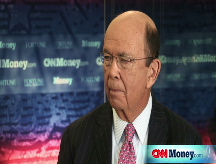Wilbur Ross: I will buy a bank
Famed distressed opportunity investor says it is only a matter of time before his firm acquires a depository institution.
NEW YORK (CNNMoney.com) -- Billionaire investor Wilbur Ross, known for his investments in distressed companies in the steel, automotive industries, said it is only a matter of time before his firm acquires a bank.
"We will end up with a bank, there is no doubt about that," Ross, the chairman and CEO of WL Ross & Co., said in an interview Tuesday.
Ross, a major player in the private equity industry, said that his plans to purchase a depository institution were delayed last year after the government moved to inject capital into the nation's banking system as part of a broader effort to halt the financial crisis.
He estimated that the rescue package delayed his investment anywhere between six to twelve months, and suggested that his firm might look to buy a commercial bank or thrift institution.
Ross made a string of investments across the financial services sector last year, including the purchase of H&R Block's (HRB) subprime mortgage servicing unit last spring for $1.3 billion and the acquisition of bankrupt American Home Mortgage Investment Corp.
But some of those bets have backfired. Last February he plowed $250 million into the bond insurer Assured Guaranty (AGO) at around $21 a share. The company's market value has been nearly cut in half since then.
Still, acquiring sources of deposits has become a top priority for banks and other financial institutions in the past few months since credit has gotten harder to come by as a result of the ongoing crisis. Private equity investors like Ross have also expressed a desire to buy banks as well.
"What is important is to get access to a stable, low-cost source of funding," Ross said. "That is what we are interested in."
Faced with a quickly rising tide of bank failures, banking regulators have relaxed restrictions about who can buy a depository institution in the hopes of coaxing outside investors to take part in the bidding.
Last Friday, a group of private investment firms, including buyout shop J.C. Flowers & Co and hedge fund Paulson & Co., struck a deal with the Federal Deposit Insurance Corp. to buy failed mortgage lender IndyMac for $13.9 billion.
As part of the deal, the buyers will take responsibility for the first 20% of losses, and the FDIC will cover the majority of additional losses.
Last week's IndyMac announcement is particularly noteworthy since there have only been a few investments made in banks by private equity firms and other distressed investors in recent months -- and many of those deals have quickly soured.
Most notably, private equity firm TPG made a disastrous investment in Washington Mutual, the savings and loan that collapsed in September. It was the largest bank failure in history. WaMu was subsequently sold to JPMorgan Chase (JPM, Fortune 500).
But Ross said it would make more sense if private equity firms are allowed to take full ownership of a bank instead of just a small stake.
"Private equity is not passive. We are not minority investors. We are control investors. That is the whole theory of private equity - adding value through better management," he said. ![]()


